Organic Synthesis: What Is It? A Comprehensive Manual

Organic synthesis is the branch of chemistry concerned with the creation of organic compounds. Organic compounds are molecules that contain carbon atoms, and they are the basis of all living things. Organic synthesis is used to create a wide variety of products, including pharmaceuticals, plastics, and dyes.
There are many different types of organic synthesis, but they can all be broadly classified into two categories: total synthesis and functional group synthesis.
Total synthesis is the process of creating a molecule from scratch, starting with simple starting materials. This is a very challenging task, and it can take many years to complete a total synthesis of a complex molecule.
Functional group synthesis is the process of modifying an existing molecule to add or remove functional groups. Functional groups are atoms or groups of atoms that give a molecule its characteristic properties. Functional group synthesis is a less challenging task than total synthesis, and it is often used to create molecules that are similar to existing molecules.
The process of organic synthesis can be broken down into four general steps:
- Retrosynthesis: This is the process of planning the synthesis of a molecule. The synthetic chemist will start by looking at the target molecule and breaking it down into smaller, simpler molecules. These simpler molecules are then broken down into even simpler molecules, until the chemist reaches a point where they can use commercially available starting materials.
- Functional group transformations: Once the retrosynthesis is complete, the chemist will then need to choose the reactions that will be used to transform the starting materials into the target molecule. There are many different types of organic reactions, and the chemist will need to choose the ones that are most efficient and selective for their particular synthesis.
- Purification: After each reaction, the chemist will need to purify the product. This is usually done by chromatography or distillation.
- Characterization: Once the product is pure, the chemist will need to characterize it to make sure that it is the correct molecule. This is usually done by spectroscopy or mass spectrometry.
Organic synthesis is a complex and challenging field, but it is also a very rewarding one. The ability to create new molecules that have never been seen before is a powerful tool that can be used to develop new drugs, materials, and technologies.
Here are some additional resources that you may find helpful:
- Organic Synthesis by Clayden, Greeves, and Warren
- March’s Advanced Organic Chemistry by Jerry March
- The Organic Chem Lab Survival Guide by Bruce Hamrock and J.J. Lipton
What is Orgo synthesis?
“Orgo synthesis” is most likely a shortened version of organic synthesis, which is a branch of chemistry focused on creating organic compounds. These are molecules primarily made up of carbon, hydrogen, oxygen, and nitrogen atoms, and are the building blocks of countless essential things, from plastics and fuels to pharmaceuticals and proteins.
Here’s a breakdown of organic synthesis:
- Goal: Build complex organic molecules from simpler starting materials through chemical reactions.
- Process: Organic chemists design a series of chemical reactions that step-by-step assemble the desired molecule. This is called a synthetic route.
- Challenges: There are many factors to consider in designing an effective synthesis, such as cost, efficiency, environmental impact, and the specific chemical properties of the target molecule.
- Importance: Organic synthesis is crucial for developing new drugs, materials, and technologies in various fields like medicine, agriculture, and electronics.
So, when you hear “Orgo synthesis,” it simply refers to the process of building organic molecules in a laboratory setting.
What is the topic of organic synthesis?
Organic synthesis is a fascinating and complex field within chemistry, primarily focused on crafting organic molecules. These molecules are the building blocks of life, and understanding how to create them is essential for various fields like:
- Pharmaceuticals: Designing and synthesizing new drugs.
- Materials science: Developing new materials with unique properties.
- Agriculture: Optimizing crop yields and creating new pesticides.
- Energy: Building components for solar cells and batteries.
- Natural products research: Understanding how natural products are made and exploring their potential for medicine and other applications.
But how exactly does organic synthesis work?
It’s essentially the art of assembling smaller, readily available molecules into the desired complex structure. Think of it like building with Lego, except the pieces are atoms and the rules are governed by chemical reactions. Organic chemists must:
- Understand the intricate properties of different functional groups: These groups determine how atoms interact and bond with each other.
- Choose the right reactions: There are countless chemical reactions available, each with its own specific requirements and products. Selecting the optimal sequence of reactions is key to achieving the desired molecule efficiently.
- Consider factors like yield, selectivity, and environmental impact: Not every reaction is created equal. Chemists strive to design syntheses that yield high amounts of the desired product, selectively target specific bonds, and minimize waste and environmental harm.
Overall, organic synthesis is a dynamic and intellectually stimulating field with far-reaching implications. It’s not just about creating molecules; it’s about pushing the boundaries of scientific knowledge and engineering the future of various industries.
Feel free to ask any further questions you have about specific aspects of organic synthesis, and I’ll do my best to explain them in a clear and engaging way!
Is organic synthesis difficult?
- Complex molecules and reactions: Organic molecules have intricate structures and can undergo a wide variety of chemical reactions. Predicting the outcome of a reaction and controlling its selectivity (getting the desired product over unwanted ones) can be challenging.
- Precise control of conditions: Many organic reactions are sensitive to temperature, pressure, time, and the presence of specific chemicals. Slight variations in these conditions can lead to unwanted products or failed reactions.
- Multi-step processes: Synthesizing complex molecules often requires multiple steps, each with its own challenges. Each step needs to be optimized and work efficiently for the overall synthesis to be successful.
- Purification: Separating the desired product from unwanted byproducts and reaction intermediates can be difficult, requiring specialized techniques like chromatography and recrystallization.
However, organic synthesis can also be rewarding and intellectually stimulating:
- Creative problem-solving: Designing a synthetic route for a new molecule is like solving a puzzle, requiring creativity and critical thinking.
- Hands-on experience: Organic synthesis involves practical lab work, allowing you to develop skills in handling chemicals, glassware, and instrumentation.
- Sense of accomplishment: Successfully synthesizing a complex molecule can be a very satisfying experience, especially when it has potential applications in medicine, materials science, or other fields.
Ultimately, the difficulty of organic synthesis depends on your individual skills, experience, and the specific molecule you’re trying to make. If you’re interested in learning more, there are many great resources available, including textbooks, online tutorials, and research papers.
Here are some additional tips that might help you:
- Start with the basics: Make sure you have a strong foundation in organic chemistry principles before attempting more complex syntheses.
- Practice, practice, practice: The more you work in the lab, the more comfortable and confident you’ll become with organic synthesis techniques.
- Don’t be afraid to ask for help: There are many experienced organic chemists who are willing to offer guidance and support.
- Most importantly, have fun! Organic synthesis can be a challenging but rewarding field, so don’t get discouraged if you don’t succeed at first. Keep learning, keep trying, and eventually, you’ll be amazed at what you can achieve.
What are the applications of organic synthesis in daily life?
Organic synthesis, the art of creating new organic molecules, touches nearly every aspect of our daily lives, from the clothes we wear to the medicines we take and the food we eat. Here are some examples:
Health and Medicine:
- Life-saving drugs: Antibiotics, painkillers, cancer treatments, anesthetics, and many other crucial medicines are all products of organic synthesis. These molecules help fight disease, manage pain, and improve our overall health.
- Diagnostic tools: Organic molecules are used in tests like CT scans and MRIs to diagnose various medical conditions.
- Vitamins and supplements: Many essential vitamins and dietary supplements are synthesized to ensure adequate intake for optimal health.
Materials and Clothing:
- Plastics: Virtually all plastics, from the packaging of your food to the parts of your electronics, are products of organic synthesis. They offer versatility, durability, and affordability.
- Synthetic fibers: Clothes made from materials like nylon, polyester, and rayon are all synthesized, offering various properties like wrinkle resistance and moisture wicking.
- Paints and coatings: Organic molecules form the basis of many paints and coatings used on buildings, furniture, and even cars, protecting them from wear and tear.
Food and Agriculture:
- Food additives: Preservatives, flavorings, and sweeteners are often synthesized to enhance the taste, shelf life, and overall appeal of processed foods.
- Pesticides and fertilizers: Organic molecules are used in pesticides and fertilizers to protect crops from pests and diseases and increase yield.
- Biofuels: Renewable energy sources like ethanol and biodiesel are derived from organic molecules, offering a sustainable alternative to fossil fuels.
Personal Care and Cleaning:
- Cosmetics and perfumes: The fragrances and ingredients in makeup, lotions, and perfumes are largely products of organic synthesis.
- Soap and detergents: Cleaning products rely on organic molecules to remove dirt and grime from surfaces.
- Fuel: The gasoline and diesel that power our vehicles are refined from crude oil, a complex mixture of organic molecules.
These are just a few examples of the countless ways organic synthesis impacts our daily lives. By understanding the power of creating new molecules, scientists and engineers continue to develop innovative solutions in various fields, making our lives healthier, more convenient, and more sustainable.
What is the importance or significance of organic synthesis?
The importance of organic synthesis is vast and multifaceted, touching nearly every aspect of our modern lives. Here are some key areas where organic synthesis shines:
Medicine:
- Developing new drugs and treatments: Organic synthesis allows scientists to create new pharmaceutical compounds that target specific diseases, like antibiotics, antivirals, and cancer medications. This opens doors for better treatments and improved health outcomes.
- Understanding existing drugs: By synthesizing specific molecules found in natural medicines, scientists can study their mechanisms of action and potentially replicate their effectiveness in synthetic forms.
- Improving drug accessibility and affordability: Synthesizing drugs can make them more widely available and affordable compared to relying solely on natural sources, particularly for rare or complex compounds.
Materials and technology:
- Creating new materials with unique properties: Organic synthesis allows for the design and creation of materials with specific functionalities, like polymers for advanced electronics, membranes for water filtration, and biocompatible materials for medical devices.
- Developing sustainable technologies: Organic synthesis can be used to create environmentally friendly materials and processes, like bioplastics and biodegradable fuels, reducing reliance on fossil fuels and their negative impacts.
- Advancement of energy storage and generation: Organic synthesis plays a crucial role in developing new battery technologies, solar cells, and other efficient energy storage and generation systems.
Other fields:
- Agriculture: Organic synthesis enables the production of pesticides, fertilizers, and other agricultural chemicals that improve crop yields and protect against pests and diseases.
- Food industry: Organic synthesis helps develop food additives, preservatives, and flavorings that enhance the shelf life, taste, and nutritional value of food products.
- Chemical research: Organic synthesis is a fundamental tool in chemical research, allowing scientists to explore new reactions, understand complex molecular interactions, and develop new theoretical concepts.
In summary, organic synthesis is a powerful tool that allows us to create new molecules with specific properties, contributing to advancements in medicine, materials science, technology, and various other fields. It shapes our everyday lives, from the medicines we take to the materials used in our clothes and gadgets. As research in this field continues, we can expect even more exciting discoveries and innovations that will benefit society in countless ways.
In Conclusion:
Organic synthesis plays a crucial role in driving scientific progress and innovation. It enables us to design and synthesize molecules that can be used for a wide range of applications. By manipulating the structure and properties of organic compounds, we can create new materials with improved performance, develop more effective drugs with fewer side effects, and design sustainable solutions to address environmental challenges. Furthermore, organic synthesis allows us to unlock the potential of natural products, harnessing their unique properties for various purposes. As our understanding of organic chemistry deepens and our synthetic methods become more sophisticated, the possibilities for discovery and advancement are virtually limitless.







